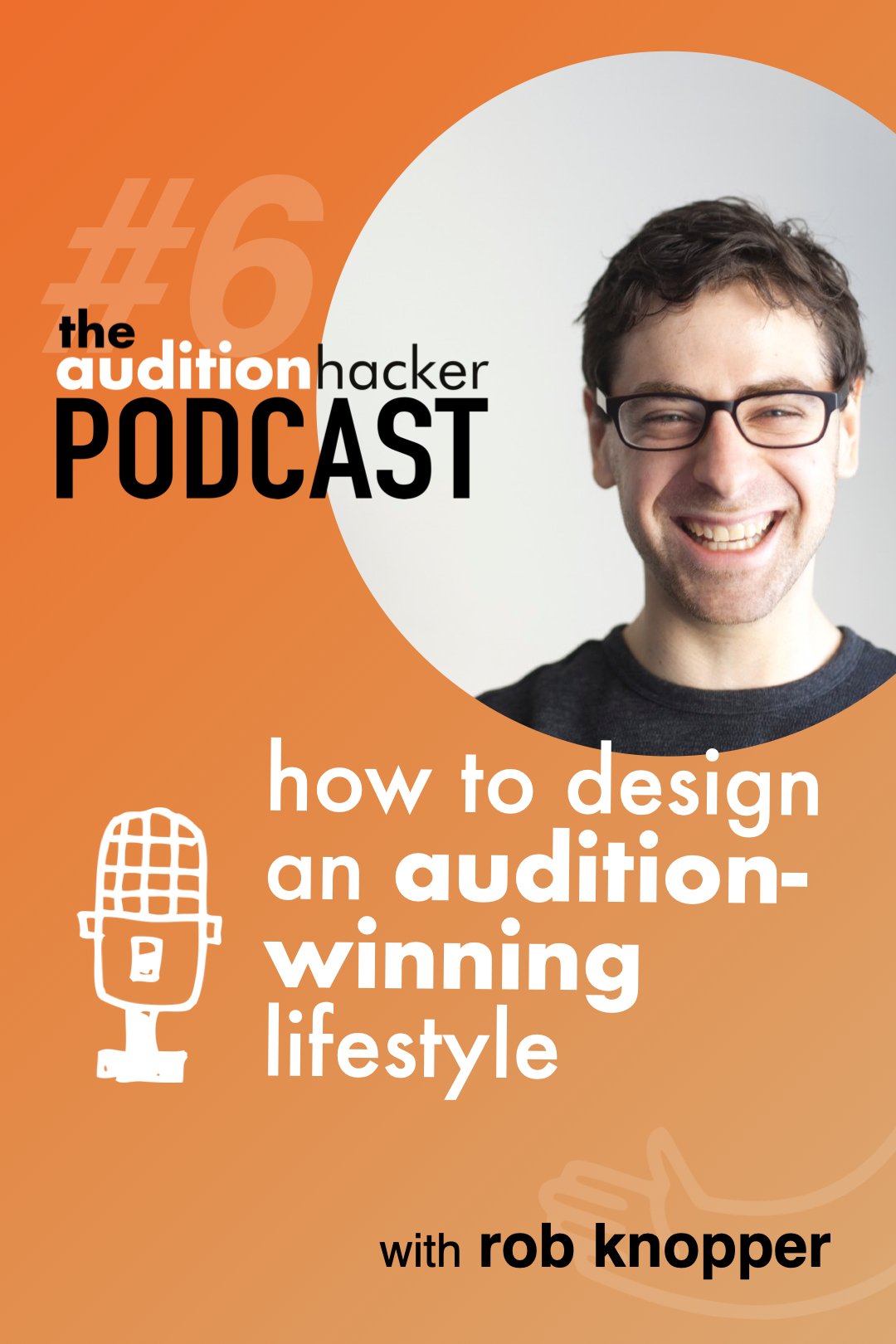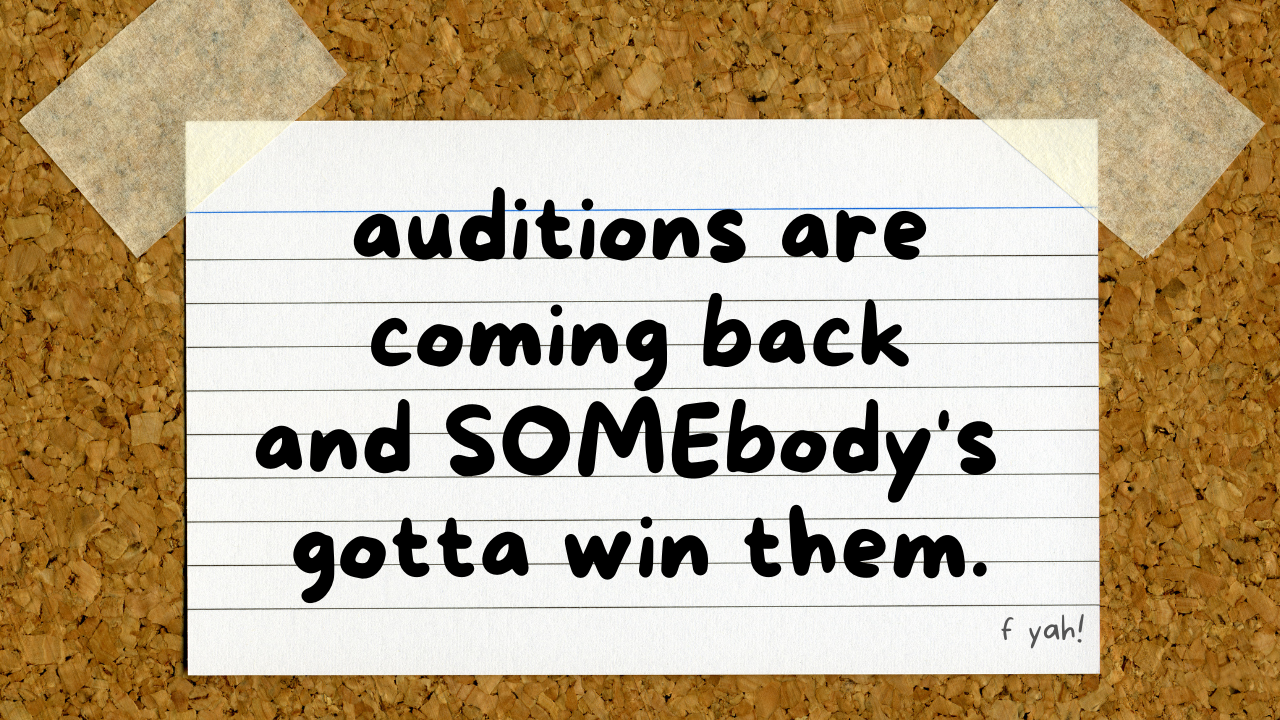two years before i won my met audition, i was rejected in the first round of 11 auditions.
that year was terrible. i was spending all my time trying to figure out how to do well in auditions, but i just kept getting cut.
it can feel like the ultimate slap in the face. three or four months of completely devoting your life to an audition… practicing every waking moment… and sometimes you don’t even get to play more than a few excerpts.
but as i was auditioning, and feeling all those rejections, i kept one thing in mind:
you can’t do something the same way as last time and expect a different result.
after each audition, once i stopped dwelling over the terribleness of it all for a minute, i’d start reflecting on my audition preparation process.
i’d choose one thing that i thought sucked and i'd just attack it. i’d start experimenting and trying a bunch of different possible ways of overcoming that particular obstacle.
eventually, for each thing, i could figure out how to do it really effectively. i’d find some combination of steps or actions that actually worked to achieve the goal i was going for. i could just apply the same steps over and over to every excerpt and trust the results.
but my system wasn’t complete yet. even though i was figuring a few things out, i was still getting rejected. because even if you improve certain parts of your process, if there are any weaknesses or gaps then your excerpts don’t come out the other side ready to win. a weakness in your process means a weakness in your performance.
but like winston churchill said: “when you’re going through hell, keep going.”
eventually what i found is that there’s a repeatable system that works for every single part of the audition preparation process, from the very beginning, the moment you get your list, to the very end - the day of the audition. if you find a weakness, there’s a methodical way to address and eliminate that weakness.
eventually it started to come together as one cohesive set of systems. i started to fill in all the gaps in my preparation and find systems to overcome the remaining weaknesses that i had. it was like an assembly line - i could insert my excerpts into one end, they’d go through each of the stations along the way, i’d do all the prescribed actions, and they would come out like audition-level nuggets of music, ready to be judged.
and as soon as it started coming together as a complete system, beginning to end, THAT was when i started seeing success. the next year, i tested this process on some smaller auditions. i was advancing in auditions and winning some smaller sublist positions. i was ecstatic cause it was starting to work. the preparation was essentially complete and built on a solid foundation.
finally, i had a chance to test it on a huge one when the MET Orchestra audition was announced. i invested 4 or 5 months into going through the complete system, and I won.
the key? i forced myself to try something new. constantly.
a lot of musicians, when preparing for an audition, just have an on or an off switch.
they practice in the way that they’ve always practiced, and they don’t make significant updates or changes to the actual steps of their audition preparation process.
there’s a good reason this happens. auditions are overwhelming! there’s SO much music to learn, and there are so many details in that music that the last thing you want to do is give up some of your time in order to try new stuff that might not work.
maybe you feel so behind that all you can do is practice your ass off and survive until audition day so that you can at least play through the excerpts.
you can’t just practice harder and expect to get much further than you did last time. sure, you might might be able to play 10% better than last time. but if you have dreams of winning a real job in an orchestra you have to figure out how to get farther than 10%. you have to get 100% better than last time. and then you have to get 100% better than that.
you have to make radical changes to your audition preparation process, over and over, if you want to ever have a chance of competing at a big audition.
introducing… the audition “mini-project.”
when you know you’ve found an issue, and you’re ready to make it better, this is a strategy to make major overhauls in your audition preparation process.
just like i did during the two years leading up to my met audition, you need to trade some of your regular practice time to experiment with new methods and exercises and fix, once and for all, the issues you’ve been seeing in your audition comments.
in my inner circle coaching program, we call it a “mini-project.” it’s been really amazing. over just a couple months, many of these musicians have completely eliminated a number of major issues in their playing, from unstable time and rhythm to phrasing issues to bringing out character and personality in their excerpts.
in today’s blog, i want to show you how you can jump into one of these “mini-projects” on your own. it’s a 5-step process and i’ll list the steps below.
if you’d like to try this out at home, you can download our mini-project template that’s usually only available if you’re a member of the inner circle coaching program. it’s the exact 3-page worksheet we’ve used over and over in the coaching program to help students make amazing progress in short periods of time. we’ll send it directly to your email:
want to nail your next audition?
check out the 3-page worksheet that will help you to eliminate major issues in your playing.
here’s the basic overview.
and you may or may not have noticed, but that is the musical version of the scientific method.
just like in 8th grade science class.
and here’s the detailed mini-project process:
step 1: define your issue. specifically.
your first job is to figure out what’s going wrong. you can use the process we talked about in last week’s blog to analyze audition comments.
and make sure you’re extremely specific so that you’re working on exactly the right problem. you shouldn’t just say “rhythm issues,” but try to be more specific. are your 16th notes swinging? are you shortening rests? is your tempo unsteady during long tones? you should even find moments in your recent audition recordings that demonstrate the problem so that you can compare it to the new version at the end of your experiment.
step 2: plan out your experiment
next, you should write out a plan of how you think you might fix the problem.
questions to ask yourself:
what exercises do you already do in the practice room that might fix that issue?
what new exercises or strategies do you want to test out?
are there books or online resources (like youtube videos) that might have more ideas?
can you work with a teacher to help you think of solutions?
which excerpt are you going to use to try to fix this issue?
write out a list of steps that you plan to go through. it should include the following:
a control variable. just like in science class, you should compare the new strategies to your old strategy to see if it’s any better.
lots of recording yourself. you need to be able to compare ‘before’ and ‘after’ recordings from each step in the process if you want to know for sure how each new strategy worked.
it’s at this point in the process when my inner circle students will send me their mini-project document. i’ll make comments up and down the document giving them ideas on various exercises they can try during their experiment.
step 3: block off time
this is actually the hardest part!
there’s always so much to do during audition prep that it can seem like each thing you already do is completely necessary and precious.
but since you can’t get better without replacing some of those steps, you need to trade some of your time to experiment.
i recommend that you block off either a full week or two or at least two hours a day for a couple weeks. that'll give you enough time to feel like this is a real project and you can let yourself fully dive in and explore.
step 4: execute and record data
now it’s time to jump into the practice room and actually DO these things. give each step as much time as it needs (within reason) to be successful. it’s easy to give up quickly, so remember that sometimes you need to stay with a process for a few days in a row to see the benefits. make sure you’re recording ‘before’ and ‘after’ takes of the excerpt so you can analyze the improvement later on.
step 5: analyze your data
once you have all the before and after recordings, you should take a few hours and really analyze exactly what the result of your experiments have been.
questions to ask yourself:
for each new experiment, did your excerpt improve?
did any strategies give you ideas on further experiments to try?
looking at all the possibilities, what are the best ways to work on this issue in your next audition preparation process?
when should you do these things during your next audition preparation process?
once you’ve done that, you can either go back to step 2 and plan out some more experiments, or you can call it a day and move onto the next issue.
and if you’d like to do this on your own at home, don’t forget to download our mini-project template that we use in the inner circle program.
want to nail your next audition?
check out the 3-page worksheet that
will help you to eliminate major issues in your playing.
and if you’re doing a mini-project, shoot me an email! i want to hear about it.
later this week i'm opening up enrollment in the spring session of my coaching program, rob’s inner circle. keep an eye on your email inbox for more details.
see you soon!

















in 2019, a cellist named maria reached out to me about her audition struggles. on paper, she was the “worst audition candidate ever” (her words). she had 2 small children, a full-time teaching job, and hadn’t taken an audition in 4 years.